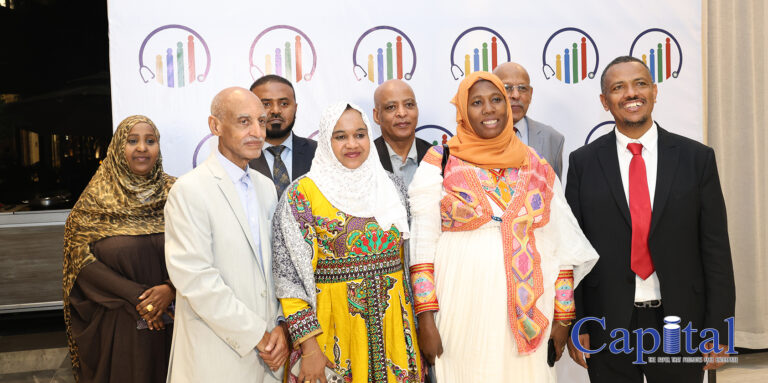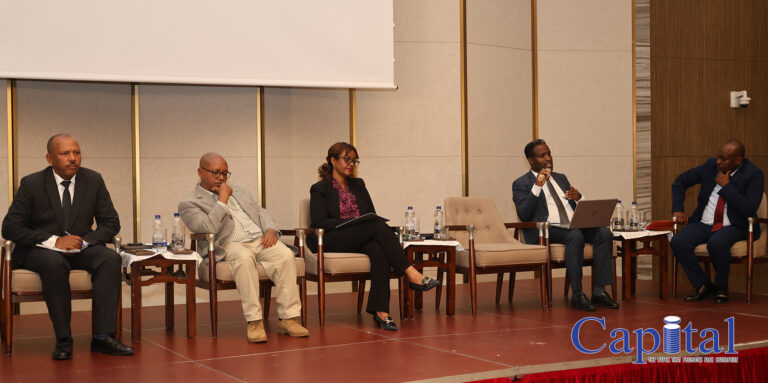Businesses throughout Addis Ababa are facing a severe crisis, with many on the verge of shutdown due to ongoing disputes with the city’s tax bureau compounded by a series of new tax policy reforms. The private sector argues these reforms are fundamentally flawed, leading to growing frustration and mistrust between business operators and tax authorities.
This predicament was brought into sharp focus during a recent high-level Public-Private Dialogue (PPD) forum, which gathered representatives from government bodies, tax officials, business chambers, and accounting professionals to discuss the theme of “Tax & Customs Reforms, Implementations & Challenges.” The forum revealed a significant and troubling gap between the government’s stated goals—centered on fairness and efficiency—and the difficult realities businesses face in their everyday operations.
At the heart of the problem, according to a representative of the Ethiopian Association of Accountants and Auditors, is not the tax policy itself but the political and institutional environment governing its implementation. The reforms are intended to bring about fairness in taxation, yet the core challenges arise from political divisions and weak institutional ties. The country’s leadership, described as “two opposing leaders,” and the lack of cohesive institutions seriously undermine the efficacy of tax reform efforts, rendering even frequent policy tweaks ineffective if these foundational issues remain unresolved.
Echoing this deep concern, Awoke Asfaw of the Association of Authorized Accountants raised alarm about the independence of tax auditors within the Ministry of Revenue. He revealed that virtually all auditors belong to political parties, a direct contradiction to the principle that tax auditors must operate free from political influence. This political affiliation compromises their impartiality, impacting the majority of taxpayers who are subjected to decisions clouded by political interests. Such a lack of auditor independence fundamentally undermines the fairness and equality essential to any credible tax system.
The implementation of new tax laws has already become a major obstacle for business operations. Aychiluhim Kebede, from the Chamber of Commerce and Sectoral Associations, illustrated this with the example of maintenance facilities that work in coordination with insurance companies. These businesses rely on contracts that stipulate fixed labor and material costs, yet have been pushed to the edge by tax demands. Aychiluhim highlighted the plight of numerous repair shop owners who have been forced to quit their work, left with no clear solutions despite assurances from tax authorities of coordination with the Ministry of Finance. This bureaucratic limbo leaves many businesses stranded and uncertain about their futures.
The forum also revealed fundamental flaws in the tax audit process itself. Business representatives pointed out the absence of a pre-audit system; businesses are obliged to submit their tax payments before any review takes place, after which the Ministry of Revenue can conduct audits at will without providing protections or safeguards for taxpayers. This unpredictable and often arbitrary approach fosters conflict and creates fertile ground for corruption, severely damaging the trust needed for voluntary compliance.
Numerous voices from the business community expressed concern about the disproportionate tax burden imposed on manufacturers and traders. One representative bluntly described it as unfair that these groups should bear heavier taxes simply to fund broad national projects. The Furniture Manufacturers Association specifically emphasized the strain caused by the introduction of a quarterly tax payment system, which imposes significant financial strain on capital-intensive sectors. They explained how a business might report a profitable year due merely to asset sales rather than operational gains, resulting in burdensome tax bills in subsequent quarters and threatening future investment prospects.
Opposition also came from the construction and oil refining sectors regarding newly introduced mandatory corporate social responsibility (CSR) payments framed as additional taxation, which these industries view as an unwelcome financial imposition lacking transparency.
Beyond policy specifics, the private sector decried the complexity and unpredictability of tax and customs procedures, which slow down business activities, especially for small and medium-sized enterprises. This complexity, combined with rising prices and security checkpoints that hinder fair competition, is making the entire business environment increasingly difficult to navigate. Furthermore, frequent failures and outages in electronic tax and customs systems further frustrate taxpayers and hamper the government’s modernization efforts, fueling resentment rather than building confidence.
Government officials attending the forum acknowledged these challenges candidly. Mulay Woldu, Director of Taxation at the Ministry of Finance, admitted that Ethiopia’s tax policies had seen little substantial change in over three decades and that the tax-to-GDP ratio had steadily declined, reaching a low 6.3% in the 2024/25 fiscal year. He outlined recent reforms, including alterations to excise tax, value-added tax (VAT), income tax, and the introduction of a minimum alternative tax designed to align the tax system with Ethiopia’s current economic conditions. However, he also recognized that awareness and understanding of tax reforms were poor across both taxpayers and tax officials, resulting in both parties often ignoring the broader goals of the reforms.
Yoseph Shiferaw, Director of Tax Compliance at the Ministry of Revenues, reaffirmed the government’s commitment to modernizing the tax system through technology upgrades and enhanced manpower. He stressed the importance of addressing the knowledge gap among taxpayers to ensure compliance and combat tax evasion more effectively.
Genet Abraham, Director of Customs Compliance at the Ethiopian Customs Commission, provided details of initiatives such as recognizing original invoices to expedite customs clearance and expanding electronic “single window” systems designed to improve operational efficiencies and transparency.
Private sector participants called for the publication of comprehensive tax guidance manuals as well as meaningful engagement with businesses before any reforms are introduced. They urged improvements in audit practices, insisting these be overseen by an independent body to ensure impartiality. Most notably, participants advocated lowering the current tax appeal guarantee money requirement from 50% to 20%, alongside permitting the use of bank guarantees, as critical protection measures for taxpayers’ rights. The establishment of an independent judicial mechanism to adjudicate tax disputes fairly and transparently was another key recommendation advanced during the dialogue.
Enhancing digital platforms, bolstering the Single Window Customs System, and delivering clear, timely information to taxpayers also featured prominently as necessary improvements to restore confidence in the tax ecosystem.
While government officials reiterated that the reforms were guided by sincere intentions to promote fairness within Ethiopia’s tax system, discussions highlighted what many described as the largest gap between policy concept and everyday policy implementation.
Deputy Commissioner Muluwork Derese of the Customs Commission detailed ongoing modernization measures aimed at providing simple, efficient, and competitive customs services. These include digitizing file entry, execution processes, and document management systems, expanding online services, and extending the electronic single window approach to boost operational transparency and speed.
However, she cautioned that tax reform cannot succeed without concurrent efforts to resolve the political and institutional issues plaguing the system, especially those stemming from the lack of auditor independence, regulatory complexity, and insufficient consultation with stakeholders.
Her final assessment was sober: until these fundamental challenges are adequately addressed, tax laws and decrees will continue to serve as mechanisms for conflict and corruption, rather than catalysts for sustainable economic growth.
The forum attracted participation from a wide array of government ministries, tax authorities, the Ethiopian Customs Commission, chambers of commerce, and various business associations. The key objective was to identify the root causes of problems within the tax and customs systems, provide a platform for the business community to voice concerns, and develop actionable recommendations aimed at fostering a fair, transparent, and efficient trade and investment environment.
Meseret Molla, Secretary General of the Addis Chamber, underscored the critical role that public-private dialogue forums play in building trust and cooperation between government and the business sector. He emphasized the importance of these platforms in addressing pressing issues like agricultural customs, which significantly impact government tax collection accuracy. Meseret affirmed Addis Chamber’s commitment to continuously organize such discussions until concrete policy implementations materialize that genuinely benefit the business community.
Natnael Melaku, General Manager of the American Chamber of Commerce in Ethiopia, commended the government for its broad economic reform agenda, noting its importance for private sector growth and the overall economy. Nonetheless, he acknowledged that AmCham members continue to face significant challenges related to tax administration inefficiencies and cumbersome customs procedures, including problems with transparency and operational effectiveness. Natnael expressed optimism that the government would swiftly resolve these issues, reflecting the private sector’s urgent desire for quick and efficient reform.
He emphasized that tax reform should extend beyond merely raising revenues; it must serve as a powerful tool to shape the business environment and accelerate private sector development. Referencing international evidence, he noted that successful tax reforms simplify complex systems, promote innovation, enable governments to mobilize resources effectively, and create conditions conducive for private sector growth.






